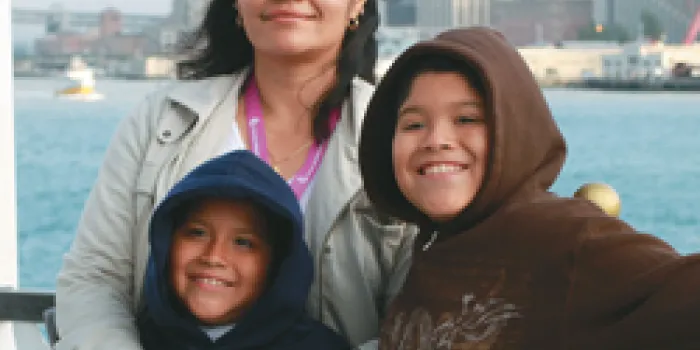The definition of the word “inhibit” is “to prohibit from doing something.” But the approximately 550 attendees at the 2011 National Hemophilia Foundation (NHF) Inhibitor Education Summits experienced just the opposite. At this year’s summits, held in June in Miami and July in San Francisco, participants were offered a chance to do something—to learn, share experiences, make new friends and reconnect with old ones.
In some people with hemophilia, the immune system defends the body against the recombinant clotting factor, which it perceives as foreign, by producing antibodies called inhibitors. Inhibitors neutralize the clotting factor, making it ineffective in treating bleeds. (See “Inhibitor Invasion.”) Children who have hemophilia with an inhibitor miss more school than children with hemophilia without an inhibitor. As adults they are more likely to experience joint damage, arthritis and other complications as a result of bleeds. Approximately 25% of people with hemophilia A and between 1% and 4% of those with hemophilia B develop an inhibitor.
The rarity of and difficulty in treating inhibitors are what make the summits so important to those who attend. “It’s great to be around others who have the same issues,” said Gee Smith, from Charlotte, North Carolina. She attended the Miami summit with her son, Christopher Justice, 9. “It’s the one chance I get to spend time with people who can give me the support I don’t have all year round. I don’t know anyone in my vicinity who has what my family has, or goes through what my family goes through.”
Continuing Education
As in previous summits, this year’s program was created by doctors, nurses, social workers, physical therapists, parents and consumers in the bleeding disorders community. The content was broken into four tracks: hemophilia with inhibitors 101, hemophilia with inhibitors 201, young men with hemophilia with inhibitors (13–19) and men with hemophilia with inhibitors (18 and older). The tracks are designed to cover all aspects of life with hemophilia with inhibitors.
“Given the impact that this bleeding disorder has on the entire family, the steering committee has always felt strongly that the family needs to be educated about both the medical aspects of hemophilia and the psychosocial aspects,” said Christa Dardaganian, NHF director of educational strategy.
For parents new to the challenges of living with hemophilia with an inhibitor, the two introductory tracks taught them about methods of treatment. Sessions covered early treatment of bleeding, prophylaxis and immunosuppression.
The summits were created in 2005 by Novo Nordisk, which supports them with an educational grant. Many people return each year, and the track system allows repeat attendees to grow as their circumstances change. “When I first began coming to the summits, my son had an inhibitor, but his titer was really low, so a lot of the sessions didn’t always apply to me,” Smith said. But now that he has a higher titer—meaning the levels of antibody in his blood have increased—he has started immune tolerance therapy. “Now, I really understand more and see how the information I’m learning can help us when we get back home.”
Sarah Henderson, of Monterey, Nebraska, said it wasn’t only the speakers who gave her information she could use. “There are so many little problems with day-to-day life that other moms have come up with solutions for,” she said. Henderson’s 4-year-old son, Lane, has an inhibitor.
Meeting the Needs of Kids and Teens
For teens, the summits offered targeted topics, with sessions that included “Truth or Consequences: The Importance of Taking Care of Your Joints” and “Identifying and Managing Pain.” Teens discussed life with an inhibitor in sessions that dealt frankly with issues of dating and sex. They also had a chance to see how a Wii Fit™ home video game system could be incorporated into a safe exercise plan in a session about sports and exercise.
The Youth Camp offered younger children a chance to play and learn. Angie Forsyth, PT, DPT; Susan Knight, PT; and Nick Zourikian, PT, provided basic emergency preparedness training as well as a fun anatomy lesson. “The kids can make lifelong friends,” said Cathy Tiggs-Johnson, MSSA, MSW, from Case Western Reserve Hospital in Cleveland, where the HTC is housed. “They can progress from going to the Youth Education Camp to the ‘young men with hemophilia with inhibitors’ track and then attend as an adult patient.”
Adult men with hemophilia with inhibitors attended sessions that focused on the needs of older people with inhibitors, including those on insurance, aging, surgery and intimacy.
Both summits capped off the experience with a Saturday night dinner cruise, in which attendees could admire the skylines of Miami and San Francisco, dance and participate in a raffle for an iPad (tablet computer). “The summits really give people a chance to take a break from their lives a little bit,” said Tiggs-Johnson. “So many of the people are in caregiver mode.” But hearing other people’s stories about dealing with an inhibitor is beneficial. “It gives them perspective on their lives and teaches them to take care of themselves.”

